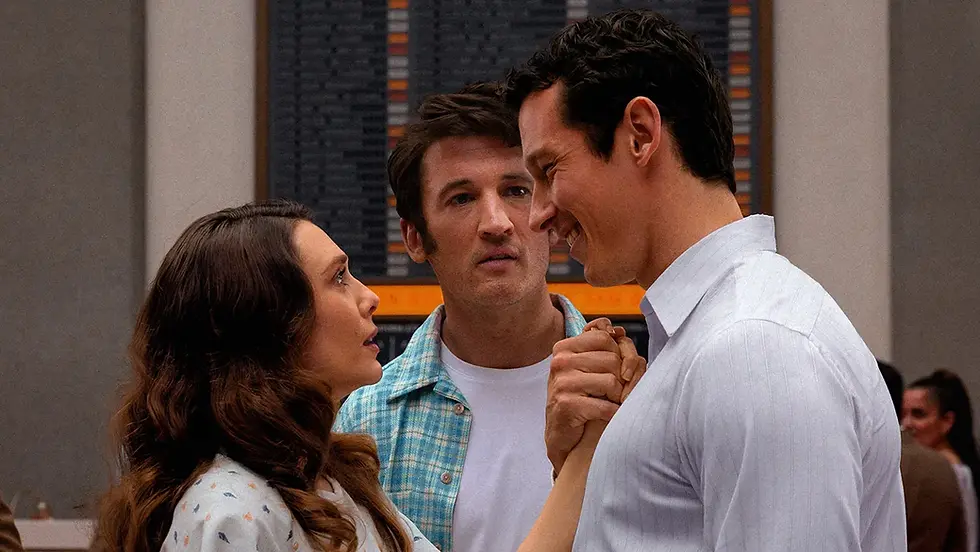Review: Mediocrity at center of Ron Howard's forgettable 'Hillbilly Elegy'
- Nate Adams

- Nov 10, 2020
- 4 min read

Courtesy of NETFLIX
Published in the summer of 2016, J.D. Vance’s “Hillbilly Elegy: A Memoir of Family and Culture in Crisis” striked a tone that appealed to both sides of the aisle. Here was a story about homegrown family values, and an eccentric chain smoking grandmother that everyone could get behind. It asked the question of how can we try to heal the divide and reach out to our fellow neighbors and understand where it is they came from? Finding common ground isn’t easy, especially in this tumultuous political landscape, and though Ron Howard deserves credit for trying to adapt Vance’s novel with a prestigious edge, it’s still a Ron Howard movie. In other words, “Hillbilly Elegy” has its heart in the right place, but is too self centered and cliched for its own good.
Which is a shame considering Vance’s autobiography is an interesting landscape to traverse: a lowly, rural Ohio kid with a less than normal childhood who ends up studying at Yale is the type of narrative Oscar prognosticators love. Yet the way Howard tries to sell the picture, wrapped in a glossy “never forget where you came from” package, seems entirely off center. There are serious issues the movie tries to tackle, but the filmmaker can’t resist the urge to go for the big moments instead of letting the somber ones settle. For every “A Beautiful Mind” - which notched Howard the best directing Oscar - there’s always “The Dilemma.”
Written by Vanessa Taylor (“The Shape of Water”) “Hillbilly Elegy” will likely find a wide audience who appreciates the message (as heavy handed and undercut as it is) when it debuts on Netflix in the coming weeks, even if the source material has been picked over for maximum, crowd-pleasing efficiency. In fact, the movie feels like it was specifically made for those who set their DVRs each week for new episodes of “This is Us.”
Hoping to goose their Oscar chances by getting doused in heavy makeup and putting on weight, Amy Adams - playing Vance’s drug addicted mother - and Glenn Close - decked out in bug-eyed glasses - as the stern granny are virtually unrecognizable. Award guilds love to reward transformative performances and it might garner Close a supporting actress nomination and that wouldn’t be the worst thing to happen in 2020.
As for the story, “Elegy” cuts back and forth between J.D.'s youth in Middletown, Ohio and the evening - a decade later - where he’s begged to return home on the eve of a huge, life changing, job interview. The script inter-cuts these moments almost simultaneously, throwing in context to help proceeding scenes. It’s a bit of hand holding that Taylor’s script doesn’t need, but will help guide audiences nonetheless. Owen Asztalos plays young J.D. as the omniscient observer in the background whose story begins in 1997, where we get a glimpse into the livelihood of his redneck clan (which includes a sister, played by the reliable Haley Bennett) and their move to Ohio.
His mom Beverly (Adams) is a nurse for the local hospital who sleeps her way through the entire town, and sneaks pain medication at work to help take the edge off. Bev is a misunderstood character that obviously loves her son - even when she’s smacking him around - but has a funny way of showing it. Naturally, the young kid grows closer to his Mamaw (Close) and spends the latter days of his high school years under her strict roof. The “Terminator 2: Judgement Day” loving granny doesn’t know if J.D. can make a life for himself outside of his heritage, but she’s sure as hell going to make sure he gets a chance.
The dynamic among the young J.D and Mamaw is far more interesting than what transpires between older J.D. (Gabriel Basso - “Super 8”) and his now estranged mother who is in the hospital for a heroin overdose. The way Howard frames both narratives almost feels like one is competing with the other, and if that’s the case, there’s definitely a victor. Equally underdeveloped is a relationship between a longtime girlfriend (Freida Pinto - wasted) who exists for J.D. as moral support and offers sage advice when literally nobody was asking for it.
At least we get the benefit of Glenn Close, who maneuvers through all the melodramatic weepiness to deliver a wholesome, unapologetic performance. Close isn’t known for turning in half-assed portrayals and her Mamaw is no different. Whether she’s spewing ideologies and metaphors on the tribulations of life, or holding one of J.D’s algebra tests close to the chest, this is the most relatable character in the entire film, and for someone who recently lost his grandmother, it felt cathartic.
Not surprisingly, the majority of “Hillbilly Elegy” rests on Mamaw’s hope that her family will lead a better life than she ever did, and judging by the opening narration, it would seem J.D already fulfilled that promise. What’s left is Howard and his crew attempting to fill in the blanks with misinterpreted success stories and relationships. Watching Vance go through the motions of the generic autobiography playbook proves maddening and suggests that while Ron Howard knows how to tackle inspirational elements (his documentary “Welcome to Paradise” earlier this year proved that) his emotional reach has lost its zest.
Grade: C
HILLBILLY ELEGY will open in select theaters starting Wednesday November 11th before debuting on Netflix November 24th.





Comments